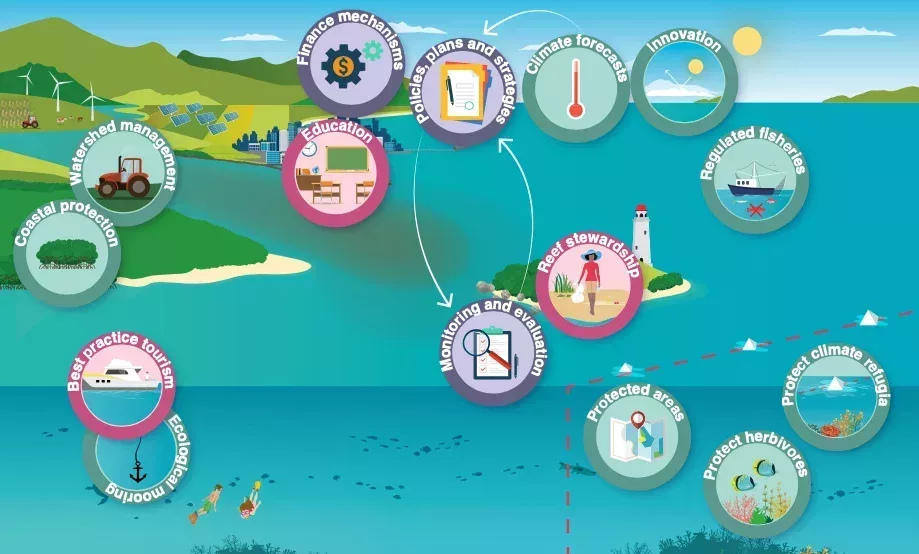The Resilience Hub has been created to share key messages about Resilience-based Management (RBM) and its benefits, promote effective implementation of RBM through policy and planning, facilitate networking and encourage cooperation among ICRI members.
Resilience-based management (RBM) is a management approach that uses knowledge of current and future drivers influencing ecosystem function to prioritize, implement, and adapt management actions that sustain ecosystems and human well-being (Mcleod et al. 2019). The main goal of RBM is to identify and prioritize management actions that enhance ecosystem resilience, which is the capacity of a system to absorb or withstand stressors so that the system maintains its structure and functions in the face of disturbance and change and can adapt to future challenges 1.
Put simply, RBM aims to identify and prioritise management actions that build the reef’s capacity to withstand and recover from disturbances.
In practice, this means:
- understanding how a coral reef ecosystem is likely to respond to impacts and different scales and using this knowledge to adapt management actions
- protecting the processes and species that support its function and integrity
- reducing local threats to reefs
- supporting ecosystem recovery processes
- supporting human dimensions, including by developing alternative livelihoods and building adaptive capacity

Why is Resilience-based Management Needed?
Applying RBM has several key benefits[2]:
- Provides a way to manage reefs under future climate change scenarios.
- Allows managers to prioritize management actions that best address future threats to the socio-ecological system and encourages adaptation and transformation.
- Informs how resources like funding and staff time will be allocated to various strategies and projects based on identified threats to the socio-ecological system.
- Empowers local conservation practitioners by providing hope and validating the role and importance of local management actions and linking the well-being of coral reefs and local communities more closely.
- Serves as a vehicle to deliver on global commitments to climate change, such as CBD Aichi Target 10and 15, Paris Climate Agreement Article 7 and 8 , UN Sustainable Development Goals Target 14.2.
To learn more visit the Reef Resilience Network’s RBM module featuring:
- An overview of RBM and how it differs from other forms of management
- Reasons and considerations for conducting RBM
- Specific recommendations for how to conduct RBM
- Examples of how RBM is currently being practiced
- Examples of other integrated management approaches
This module was developed by RRN in in collaboration with the following organizations: Great Barrier Reef Foundation, National Oceanic and Atmospheric Administration Coral Reef Conservation Program, Great Barrier Reef Marine Park Authority, International Coral Reef Initiative, United Nations Environment Program, and the University of Queensland.

